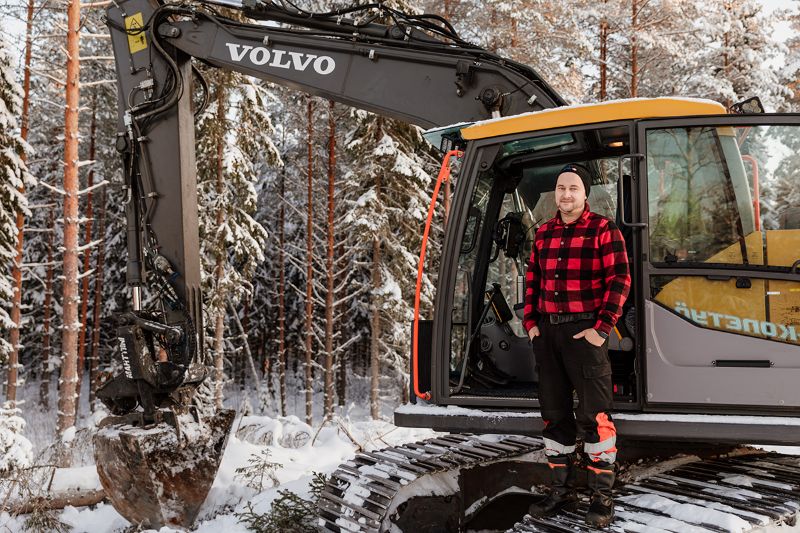Excavator driver
"I mainly work in the forest, and spend most of my time in the cab of my excavator. Spring is a busy time, so I work longer days and at weekends. In autumn, there's less work and the working days are shorter."

- Lauri Leppänen
- Owner of the company LL-Konetyö.
- Completed a forest machine driver's basic qualification at Jämsä Vocational College.
- Ten years of work experience in the field.
Briefly explain what you do for a living.
I work as an excavator driver. At the moment, I mostly do forest improvement work, i.e. I use an excavator to prepare the forest soil for planting saplings. I also make and maintain forest roads and collect wood for burning. In between, I restore fields and dig farm drains and sometimes plots for summer cottages.
How have you ended up in the profession of your choice?
I come from a farm. I've always been interested in machines, so I've been around them since I was a kid. That's why I went to study forest machinery in Jämsä after my basic schooling. After qualifying, I drove a forest machine for a while until I was offered a job as an excavator driver. In 2017, I started my own business and bought my own excavator.
Describe your typical working day or week.
Every working day is different, but most of the time is spent in the cab of my machine. In the morning, I first have a coffee, make my lunch and drive to the work site where I might prepare forest land for planting saplings. Sometimes I service the excavator or move it with a trailer and truck.
I also discuss with the landowner about the details of the work. I'm also in contact with the Forestry Management Association, as it provides me with contract work and gives me guidance. Sometimes I visit the site in advance, plan future work with the customer or make offers.
What kind of work environment or working hours do you have?
I mainly work in the forest, and spend most of my time in the cab of my excavator. I decide for myself what times I work. As an entrepreneur, I often think about work, even when I'm not actually working. A typical working day is 10 hours. Spring is a busy time, so I work longer days and at weekends. In autumn, there's less work and the working days are shorter.
What kind of competence or qualities are required in the profession?
In this job, you need to be interested in excavators and the jobs that they can do. You also have to be willing to learn new things because, for example, forest certification and the protection of water bodies are constantly changing as new guidelines are issued. The requirements of the job vary depending on the job.
It’s good to be comfortable working alone because most of this work is done independently. You must be able to solve problems on the spot by yourself. Customer service skills are also important, as there are many different types of landowners and you have to get along with them.
What is the best thing about your profession?
The best thing is freedom and variety. I love the forest, so I prefer to be in nature rather than in the hustle and bustle of people. In addition, in this profession you can see the result of your work.
What are the downsides of the profession or what seems challenging?
In Finland, the weather can be challenging at times but you have to go to work, whatever the weather. For example, repairing an excavator in cold rain can feel like a chore.
What would you tell a person considering the profession of a excavator driver?
If you're interested in the machinery sector, it’s worth considering a career as an excavator driver. Excavators can work in a wide variety of environments, such as forests, buildings and at roadworks sites.
How do you see the future of your profession?
Digitalisation is increasing all the time, and all work stages are recorded on a digital map. Environmental awareness and regulations are also increasing, and you need to know an increasing amount about them.
Photo: Sami Mäkinen
